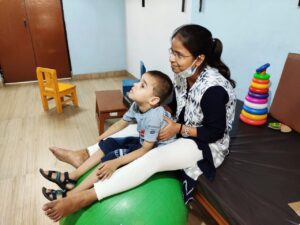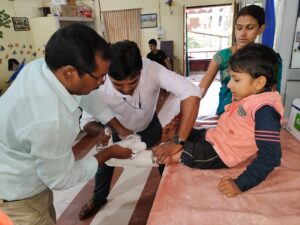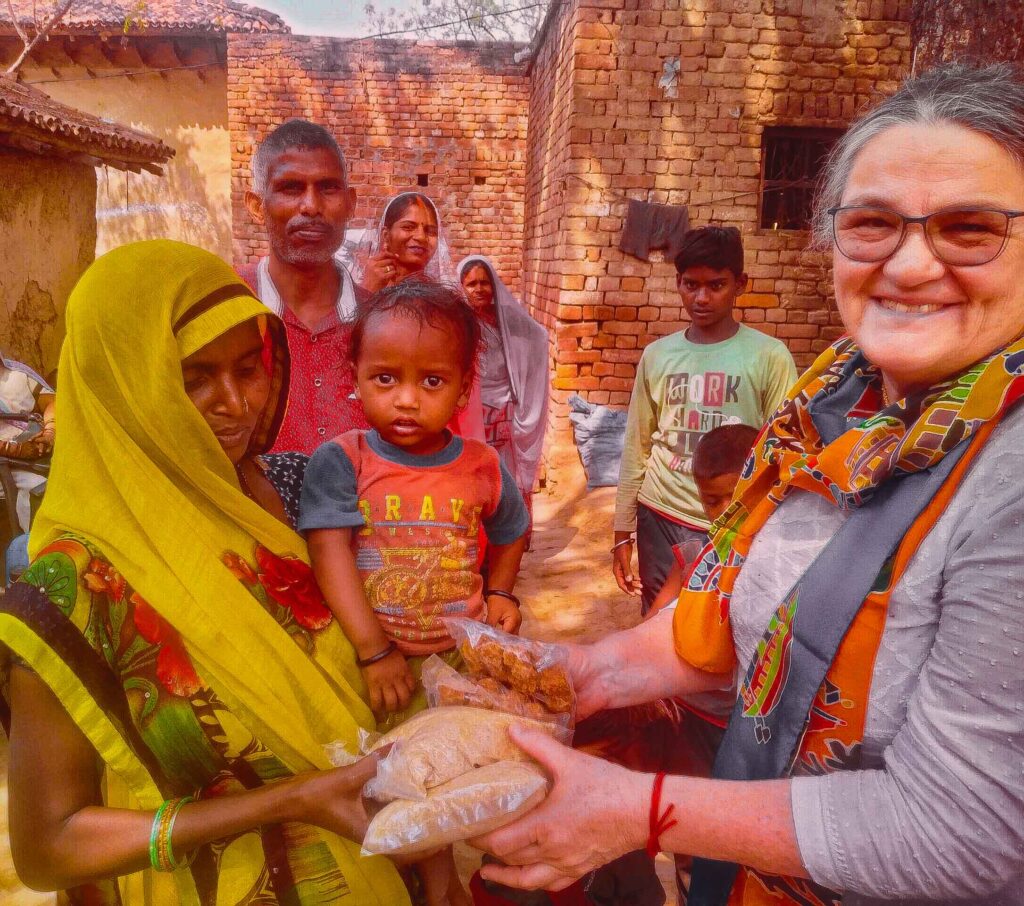Health Care Services
At KIRAN, we like to visualize empowerment as a series of stepping stones.
KIRAN delivers comprehensive rehabilitation services, including medical and physical care, both within institutional settings and in communities. Our approach focuses on nutrition, health, and hygiene, complemented by therapeutic interventions such as physiotherapy, speech therapy, psychology, occupational therapy, hydrotherapy, hippotherapy, music therapy, and prosthetic and orthotic care. To expand our impact, our outreach programs conduct rehabilitation camps in Varanasi, Gazipur, Mau, and Durgawati district in Bihar. Beyond direct patient care, KIRAN empowers parents of children with disabilities through training and support.
The Health Department Consists of Six Units

Parents and Child Care Unit
PCCU is the gateway to KIRAN Society for parents and children with disabilities, offering diagnosis, rehabilitation planning, and support, primarily for cerebral palsy.

Parents and Child Care Unit

Out – Reach Services
KIRAN's Outreach Unit reaches remote, neglected children with disabilities, offering holistic rehabilitation, therapy, and support in Uttar Pradesh and Bihar.

Out – Reach Services

Community Based Rehabilitation
The CBR unit, part of the health department, offers vital services like health, nutrition, education, and therapy to underprivileged children. It covers rural areas in Varanasi and Mirzapur, Uttar Pradesh.

Community Based Rehabilitation

Prosthesis and Orthotic unit
KIRAN Society's P&O unit creates and fits Prosthetic and Orthotic appliances, emphasizing quality for children and youngsters, especially in remote villages, to minimize repairs and costs.

Prosthesis and Orthotic unit

Physio and occupational Unit
This unit offers physical rehabilitation to children and youth with disabilities, including those in vocational training, and KIRAN staff with locomotor disabilities.

Physio and occupational Unit

Clinic
KIRAN's polyclinic offers a wide range of health services, including prevention, treatment, rehabilitation, and referrals, with a focus on school children and OPD cases.

Clinic

Parents training Program
Parent’s training programme is one of the key activities of rehab department. Under this programme, Kiran society trained approximately 75 families every year in a 5-day residential training programme with 5 to 6 families in each group. Through this programme, parents are trained and motivate so that they can actively participate in the rehabilitation process. A multidisciplinary team (Neurologist, Psychologist, Speech Therapist, Physio-Occupational Therapist, Special Educator and Nurse) assess the children to find out the basic level of functioning and their needs. Parents training program is organized especially for those parents who are poor and illiterate.
Parents training Program
Kiran Society's Parents' Training Program annually trains around 75 families, empowering them to participate actively in their children's rehabilitation, particularly focusing on underprivileged and illiterate parents.

Feeding Training Program
Feeding is a very important part of child’s holistic development. Most of the children affected by cerebral palsy have difficulties in swallowing and feeding problems. For these cases we organize feeding training program for one day. A speech therapist, physiotherapist and nurse are involved in this program to guide and train to the parents of children with feeding difficulties.
Feeding Training Program
We organise one-day feeding training programs for children with cerebral palsy, involving speech therapists, physiotherapists, and nurses to guide parents.

Family Mediated Intervention Program
This is also an early intervention program for children up to the age of 6 years, especially designed for children with autism and developmental delays. In this program family is at the centre of intervention: parents are trained to facilitate developmental age/skills of their children. This is a 11 months program in which parents are called every 2 weeks for sessions. The professionals involve in this program are speech therapist, physio/occupational therapist, psychologist, special educator and neurologist.
Family Mediated Intervention Program
An 11-month early intervention program for children with autism and developmental delays emphasizes parental involvement and professional support.

The GANESH Project
Centered Approach for Neurodevelopmental Disorder Identification and Early Intervention.
Download Research PaperIndia has the world’s largest birth ratio (about 26 million per year). With a population of more than 199 million, Uttar Pradesh is the most populous state in India. Lack of antenatal care, unsafe child births, under nourishment and lack of access to healthcare infrastructure are among the main risk factors for maternal and child morbidity and mortality.
Neurological and developmental disorders and disabilities in particular compromise the attainment of full Neurological and developmental disorders and disabilities in particular compromise the attainment of full social and economic potential at family and community levels. In other words, almost one in 11 children has at least one of the following impairments: neuromuscular disorders and cerebral palsy, epilepsy, intellectual disability, speech and language disorders, hearing and/or vision impairment or autism.
The General Movement Assessment (GMA) is regarded as the best clinical tool to predict cerebral palsy in infants <5 months. In addition, children with developmental delay, intellectual disabilities, late detected genetic disorders or autism spectrum disorder show abnormal general movements (GMs) during infancy. General Movement Assessment in Neonates for Early Identification and Intervention, Social Support and Health Awareness (G.A.N.E.S.H.) aims and to provide evidence as to whether community health workers can support the identification of infants at high- risk for neurological and developmental disorders, disabilities, and to monitor further development in those infants and to initiate early and targeted intervention procedures.
Apart from low birth weight (<2500 g) and preterm birth (<37 weeks’ gestation), non-institutional delivery, a history of perinatal asphyxia (delayed cry and difficult breathing at birth), neonatal illness requiring hospitalization, postnatal brain infections and stunting are significantly associated with neurological and developmental disorders and disabilities. Several of these risk factors could be averted through public health intervention. There is strong evidence that early intervention improves functional outcomes for infants with neurological and developmental disorders and is economically cost- effective as it reduces the rate and severity of later impairments. However, low-income communities, which are most vulnerable to neurological and developmental disorders, often lack programmes for early identification and intervention.
The G.A.N.E.S.H. project is perceived by the communities as part of the ongoing services, which have been provided by KIRAN Society. This project is implemented in 54 (cluster of) villages in 3 blocks of two districts of Uttar Pradesh, where the burden of poverty and undernutrition is particularly high. More than 90% of newborn infants are brought to the free services in the primary health centers or the community health workers are welcomed at the family home. As part of the Indian culture, after having given birth, young mothers may move to the grandmother’s home, possibly in another district.
The KIRAN staff with the support of community health workers, they are using mobile tools to pursue a broad range of health education goals including subjects such as vaccination, nutrition, hygiene and sanitation, but most importantly, they provide regular personal care and door to door services in their communities. In addition, the most socio-economically disadvantaged families (especially pregnant women and lactating mothers, infants and young children) in terms of food supplements containing vitamins, iron and calcium.
This project has brought a ray of hope to their families benefitting many children.

The GANESH Project
Centered Approach for Neurodevelopmental Disorder Identification and Early Intervention.
Download Research PaperIndia has the world’s largest birth ratio (about 26 million per year). With a population of more than 199 million, Uttar Pradesh is the most populous state in India. Lack of antenatal care, unsafe child births, under nourishment and lack of access to healthcare infrastructure are among the main risk factors for maternal and child morbidity and mortality.
Neurological and developmental disorders and disabilities in particular compromise the attainment of full Neurological and developmental disorders and disabilities in particular compromise the attainment of full social and economic potential at family and community levels. In other words, almost one in 11 children has at least one of the following impairments: neuromuscular disorders and cerebral palsy, epilepsy, intellectual disability, speech and language disorders, hearing and/or vision impairment or autism.
The General Movement Assessment (GMA) is regarded as the best clinical tool to predict cerebral palsy in infants <5 months. In addition, children with developmental delay, intellectual disabilities, late detected genetic disorders or autism spectrum disorder show abnormal general movements (GMs) during infancy. General Movement Assessment in Neonates for Early Identification and Intervention, Social Support and Health Awareness (G.A.N.E.S.H.) aims and to provide evidence as to whether community health workers can support the identification of infants at high- risk for neurological and developmental disorders, disabilities, and to monitor further development in those infants and to initiate early and targeted intervention procedures.
Apart from low birth weight (<2500 g) and preterm birth (<37 weeks’ gestation), non-institutional delivery, a history of perinatal asphyxia (delayed cry and difficult breathing at birth), neonatal illness requiring hospitalization, postnatal brain infections and stunting are significantly associated with neurological and developmental disorders and disabilities. Several of these risk factors could be averted through public health intervention. There is strong evidence that early intervention improves functional outcomes for infants with neurological and developmental disorders and is economically cost- effective as it reduces the rate and severity of later impairments. However, low-income communities, which are most vulnerable to neurological and developmental disorders, often lack programmes for early identification and intervention.
The G.A.N.E.S.H. project is perceived by the communities as part of the ongoing services, which have been provided by KIRAN Society. This project is implemented in 54 (cluster of) villages in 3 blocks of two districts of Uttar Pradesh, where the burden of poverty and undernutrition is particularly high. More than 90% of newborn infants are brought to the free services in the primary health centers or the community health workers are welcomed at the family home. As part of the Indian culture, after having given birth, young mothers may move to the grandmother’s home, possibly in another district.
The KIRAN staff with the support of community health workers, they are using mobile tools to pursue a broad range of health education goals including subjects such as vaccination, nutrition, hygiene and sanitation, but most importantly, they provide regular personal care and door to door services in their communities. In addition, the most socio-economically disadvantaged families (especially pregnant women and lactating mothers, infants and young children) in terms of food supplements containing vitamins, iron and calcium.
This project has brought a ray of hope to their families benefitting many children.
